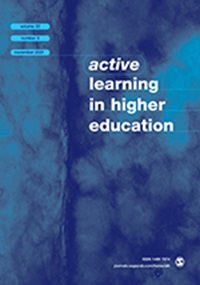高校学生的学习收获观
IF 3.2
1区 教育学
Q1 EDUCATION & EDUCATIONAL RESEARCH
引用次数: 0
摘要
高等教育中的学习收获,特别是与学科相关的技能、能力和才干的发展,具有重要的学术和政策意义。然而,很少有研究关注学生对学习收获的广泛理解。本文采用现象学的方法来探讨学生对学习收获的概念,以及不同学科和学习阶段对学习收获的不同理解。本文通过对英国三所大学四个学科的不同本科生和研究生进行的 33 次定性访谈,得出了与学习收获有关的三个不同类别的理解,其复杂程度依次递增。第一类是天真的理解,其特点是短期学习目标,优先考虑包括记忆在内的表面学习方法,学科知识比技能更重要。学习动机主要是外在的,与评估有关。第二类是新兴理解,其特点是对学习方法有更多的认识,包括根据一系列目标有条 理地规划学习活动,以及对理想的学习成果作出务实的反应。学生越来越认识到学科技能与通用技能之间的联系,适应性也很强。最复杂的类别是全面理解,其特点是学习目标灵活,承认高等教育学习的独立性质, 自我调节能力强,有意识地优先考虑深层次的学习方法。对知识的动态看法占主导地位,这也是这一类与其他两类的区别所在。随着学习阶段的增长,这些理解类别的复杂性也在增加,而且因学习科目的不同而异,在学习收获的优先方面、对变化的看法以及如何在学习科目中明确学习收获方面存在着相互作用。因此,为改进学习收获而进行的任何尝试都需要涵盖学习收获的各个方面,根据学科和阶段的具体情况,并纳入学生的视角。本文章由计算机程序翻译,如有差异,请以英文原文为准。
Higher education students’ conceptions of learning gain
Learning gain in higher education, specifically the development of subject-adjacent skills, abilities and competencies, is of key scholarly and policy relevance. However, little research focuses on students’ broad understandings of learning gain. This paper takes a phenomenographic approach to explore students’ conceptions of learning gain, and how these may differ by subject and stage of study. Drawing on thirty-three qualitative interviews with a diverse group of undergraduate and postgraduate students across four subjects in three UK universities, this paper derives three distinct categories of understanding in relation to learning gain, increasing in complexity. The first category, naïve understandings, is characterised by short-term learning goals, the prioritisation of surface approaches to learning including memorisation, with subject knowledge more important than skills. Motivations to learn are broadly extrinsic and related to assessments. The second category, emergent understandings, features greater awareness of approaches to learning, including structured planning of learning activities in response to a range of goals, and pragmatic responses to desirable learning outcomes. There is growing recognition of links between subject-specific and generic skills, and adaptation features strongly. The most sophisticated category, comprehensive understandings, is characterised by flexible learning goals, the acknowledgment of the independent nature of higher education learning and strong self-regulation, with deep approaches to learning consciously prioritised. Dynamic views of knowledge prevail, which distinguish this category from the other two. These categories of understanding grow in complexity with study stage, and also vary by subject of study, with interactions present in relation to prioritised aspects of learning gain, views of change and how explicit aspects of learning gain are made within the subject of study. Any attempt to capture learning gain for its improvement would therefore need to encompass a variety of aspects of learning gain, contextualised for subject and stage and include a student perspective.
求助全文
通过发布文献求助,成功后即可免费获取论文全文。
去求助
来源期刊

Active Learning in Higher Education
EDUCATION & EDUCATIONAL RESEARCH-
CiteScore
13.20
自引率
12.00%
发文量
31
期刊介绍:
Active Learning in Higher Education is an international, refereed publication for all those who teach and support learning in higher education (HE) and those who undertake or use research into effective learning, teaching and assessment in universities and colleges. The journal is devoted to publishing accounts of research covering all aspects of learning and teaching concerning adults in higher education. Non-discipline specific and non-context/country specific in nature, it comprises accounts of research across all areas of the curriculum; accounts which are relevant to faculty and others involved in learning and teaching in all disciplines, in all countries.
 求助内容:
求助内容: 应助结果提醒方式:
应助结果提醒方式:


